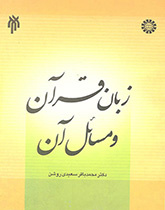
The Language of Quran and Its Issues
The language of religion today is one of the important topics of research in the philosophy of religion that includes various issues. Some of these issues are old and some are new or have new dimensions. The method of the language of religion and the interpretability or one-sidedness of the language of these texts have been discussed for a long time, but the significance of religious propositions and teachings, the function of the language of religion from a motivational or epistemological perspective, astonishment or mystery of the language of religion, influence of the contemporary culture and language on the language of religion are among the most important issues of the contemporary era. This type of issues today, in adaptation with the Holy Quran, is raised and needs serious analysis. Determining the position on the mentioned issues is the basis of interpretation and hermeneutics specific to the Qur'an and has a fundamental effect on the interpretation of the Qur'an. "The language of the Qur'an and its issues" deals with issues related to the language of Quran in order to present a novel theory on the issues of the language of the Qur'an, in contrast to competing theories in the language of religion, with a positive and problematic approach and citing epistemological-reasoning principles. This book, while providing basic information in the field of the language of religion and the language of the Qur'an and answering the most important questions in the language of the Qur'an, also attempts to critique and analyze views that are inconsistent with the epistemological foundations of the Qur'an.
Selected Book of the 4th Farabi International Award, 2009




